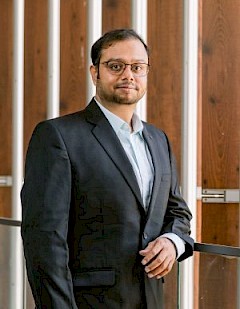Faculty Fellows

Samyaday Choudhury
Assistant Professor
PhD (Indian Institute of Science, Bengaluru)
+91.79.61911000
+91.9989989980
https://sites.google.com/view/samyadayspage/home
Research Interests: Star Formation, Stellar Evolution, Galaxy Evolution, Space Astronomy, Big Data Analysis in Astronomy
Profile
Samyaday Choudhury earned his PhD degree from the Indian Institute of Science, Bengaluru, in 2016 under the Joint Astronomy Programme. He had carried out his PhD thesis work at the Indian Institute of Astrophysics, Bengaluru. After completing his PhD, he was a 'Lee Wonchul Postdoctoral Fellow' at Yonsei University Observatory, South Korea, and a Postdoctoral Research Fellow at Macquarie University, Australia. Prior to joining Ahmedabad University, Professor Choudhury was an ‘Evolved Star Postdoctoral Fellow’ at the Space Telescope Science Institute, USA, the operation centre for prominent NASA space observatories like the Hubble Telescope and the James Webb Space Telescope.
Research
What is it about
As the human race continues its quest to unveil the grandeur of the Universe, answers to several fundamental questions about the evolution of galaxies and the formation of stars in them remain elusive. As a cosmic detective, Professor Choudhury proactively hunts for answers by studying galaxies in our nearby Universe, i.e. those in the vicinity of the Milky Way and in our local neighbourhood. These grand structures and celestial bodies near us are simply fossil records of the various physical processes involved in their formation and evolution events since the early phases of the Universe. Professor Choudhury is particularly interested in star forming dwarf galaxies, whose chemical and physical environments are vital proxies to star formation and galaxy evolution events in the nascent phase of the Universe. He uses multi-wavelength (ultraviolet to near-infrared) data from Big Sky Surveys and targeted observations from prominent space-based telescopes (e.g. India's AstroSat, NASA’s Hubble Telescope) and ground-based optical telescopes of the world to carry out these studies. He employs image analysis techniques, mathematical and statistical techniques, and algorithms to analyse these data, and uses physical models to interpret the associated astrophysical phenomena involved in the above processes. He has published several articles in the above domains in international journals of Astronomy and Astrophysics. Professor Choudhury leads his research projects in collaboration with some prolific research groups based in India, the USA, Europe, Australia, and South Korea.
Exciting results
By developing smart, robust, and versatile data analysis techniques, he has deciphered some of the global properties, like chemical enrichment maps and cluster formation history, of the most massive satellite galaxies of our Milky Way, called the Magellanic Clouds. The estimation of these properties are crucial in the context of understanding the secular evolution of these satellites and their gravitational interaction history with the Milky Way. The results have implications on our understanding of star formation history, mass accumulation, and interaction history of similar systems in our Universe (minor galaxy merger events).
Vision
Professor Choudhury aims to carry out cutting-edge research in the field of Astronomy and Astrophysics, which is in synergy with the long-term goals of the international astronomy community and relevant in the era of Mega-telescope projects (e.g. the Thirty Meter Telescope). In this fascinating era of Big Data resulting from Big Sky Surveys (e.g. Gaia survey, surveys by upcoming Large Synoptic Survey Telescope and Roman Space Telescope), next-generation space telescopes by India, and international agencies like NASA and ESA, future studies in this field necessitate problem-solving abilities from interdisciplinary fields (e.g. Big Data Analysis). He is interested in opportunities to collaborate and apply big data analysis techniques to Astronomy.
Short term and PhD projects available: To be updated soon. Please check out the personal webpage of Professor Choudhury.
Publications
- Choudhury S., de Grijs, R., Bekki K.; Cioni M. R. L., Ivanov V. D.; van Loon J. T, Miller A., Niederhofer F., Oliveira J. M., Ripepi, V., Sun N., Subramanian S.; "The VMC survey –: Mapping metallicity trends in the Large Magellanic Cloud using near-infrared passbands" – 2021, Monthly Notices of the Royal Astronomical Society, 507, 4752 .
- Choudhury S., de Grijs, R., Stefano R.; Bekki K.; Cioni M. R. L., Ivanov V. D.; van Loon J. T, Niederhofer F., Oliveira J. M., Ripepi, V.; "The VMC survey – XXXIX: Mapping metallicity trends in the Small Magellanic Cloud using near-infrared passbands"; 2020, Monthly Notices of the Royal Astronomical Society, 497, 3746.
- Choudhury S., Subramaniam A., Cole A. A. and Sohn Y. -J.; “Photometric metallicity map of the Small Magellanic Cloud”; 2018, Monthly Notices of the Royal Astronomical Society, 475, 4279.
- Choudhury S., Subramaniam A., Cole A. A.; “Photometric metallicity map of the Large Magellanic Cloud”; 2016, Monthly Notices of the Royal Astronomical Society, 455, 1855.
- Choudhury S., Subramaniam A., Piatti A. E.; "Deep Washington Photometry of Inconspicuous Star Cluster Candidates in the Large Magellanic Cloud”: 2015, Astronomical Journal, 149, 52.
Teaching
Winter Semester – Foundation Programme: Module 3 of Democracy and Justice studies.
Awards
- 2022: Awarded observation time on the Hubble Space Telescope as a Co-Investigator.
- 2021: Awarded observation time on the 3.9m Anglo-Australian Telescope, Australia, as a Co-Investigator.
- 2021: Awarded observation time as Principal Investigator using the UVIT/AstroSat (88,900 s). The AstroSat is India’s first multi-wavelength space telescope
- 2020: Awarded observation time as Principal Investigator using the UVIT/AstroSat (10,000s).
- 2017-till date: Awarded observation time in several cycles as Co-Investigator for ‘GloBules’ survey using the UVIT/AstroSat.
- 2016-2018: Lee Wonchul Postdoctoral Fellowship at Yonsei University Observatory, South Korea.
- 2014: Department of Science and Technology (DST) India, travel grant to Australia for collaborative work.
- 2014: Best Poster Award in the category of ‘Extra-galactic astronomy and Cosmology’ during the 32nd Annual Meeting of the Astronomical Society of India.
- 2012-2015: Senior Research Fellowship during PhD from DST, India).
- 2009-2011: Junior Research Fellowship during PhD from DST, India).
- 2008: Qualified National Eligibility Test (NET) for an award of Junior Research Fellowship and eligibility for Lectureship (under the Council of Scientific and Industrial Research Fellowship scheme, India).
- 2008: Summer Fellowship by the Indian Academy of Sciences.
